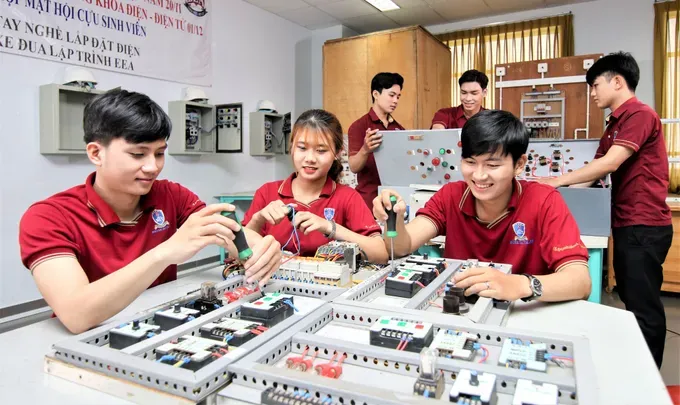
The Ministry of Education and Training is currently leading the drafting of a decree that outlines scholarship policies for students pursuing studies in basic sciences, critical engineering disciplines, and strategic technologies. These fields serve as the cornerstone of the science and technology ecosystem and are pivotal in developing a high-quality workforce, fostering innovation, and driving the nation's digital transformation.
According to Deputy Minister of Education and Training Le Tan Dung, the development of the draft decree is one of the important tasks assigned by the Government to the Ministry of Education and Training to concretize the Government's action program to implement the Politburo's Resolution No. 57-NQ/TW on breakthroughs in science and technology development, innovation and the national digital transformation.
Therefore, the formulation and implementation of preferential policies and targeted mechanisms to attract, develop, and nurture human resources in the aforementioned fields is both an urgent and strategic imperative. These efforts are essential to advancing the nation’s long-term and sustainable development goals in the current era.
In the context of the Fourth Industrial Revolution and global integration, basic sciences, core engineering, and strategic technologies are pivotal in driving innovation, enhancing production capacity, and boosting the competitiveness of the national economy. However, the limited quantity and quality of human resources in these fields hinder research capabilities, the adoption of new technologies, and the development of critical sectors. Scholarship policies serve as effective tools to attract and retain talented students, encouraging them to pursue and remain committed to basic sciences and strategic engineering disciplines.
Representatives from various universities have noted that, under current regulations, public higher education institutions are required to allocate at least 8 percent of tuition revenue, while private institutions must allocate at least 2 percent, to fund scholarships aimed at encouraging student enrollment. The minimum scholarship amount is set equivalent to the student's tuition fee.
However, the distribution of these scholarships is often uniform, failing to prioritize fields with high difficulty, low enrollment rates, or strategic importance. Existing scholarship and support policies lack comprehensiveness, particularly as they do not extend to postgraduate students. Notably, there is no national scholarship policy specifically designed to attract students to critical science and technology disciplines, key engineering, or strategic technology fields. Current support policies primarily focus on social assistance rather than strategically fostering and developing talent.
Head Tran Thanh Thuong of the Admissions and Student Affairs Department at Ho Chi Minh City University of Technical Education highlighted that the high costs of education and financial pressures deter many prospective students from pursuing majors in science, technology, engineering, and mathematics (STEM). In this context, scholarship and tuition support policies serve as critical tools to alleviate financial burdens, enabling students to confidently pursue their passions, particularly at institutions dedicated to advancing STEM education.
The university allocates VND60 billion (US$2.2 million) annually to its scholarship fund, in addition to other scholarship programs, yet these resources remain insufficient to meet the growing demand.
Head Trinh Thanh Deo of the Department of Examination and Quality Assurance at the University of Science (VNU-HCM) emphasizes the importance of broadening the scholarship policy for higher education. This expansion should include comprehensive support that goes beyond just scholarships and tuition fees, as well as fostering public-private partnerships in scholarship provision. At present, the scholarship policy primarily targets undergraduate students.
However, amid the rapid development in science and technology, there is an increasing urgency for a high-quality research and teaching workforce at the postgraduate level. To address this demand and encourage sustainable development, it is essential to extend scholarship opportunities to higher education levels, including master's and doctoral programs.
Lecturer Duong Ngoc Khanh from Hanoi University of Science and Technology points out that the existing scholarship policy and financial assistance for postgraduate education do not adequately reflect the significance of training highly skilled human resources, which are crucial for the advancement of science, technology, and national innovation.
In contrast to countries like the US, South Korea, and Singapore—where graduate students typically benefit from waived tuition fees, monthly stipends, thesis funding, and paid opportunities through teaching or research—Vietnamese graduate students often face financial hardship. Many are compelled to work alongside their studies just to make ends meet. The absence of robust support policies contributes to a high dropout rate, and the lack of dedicated student loan programs further limits access to legitimate financial resources for those hoping to pursue long-term academic research.
























